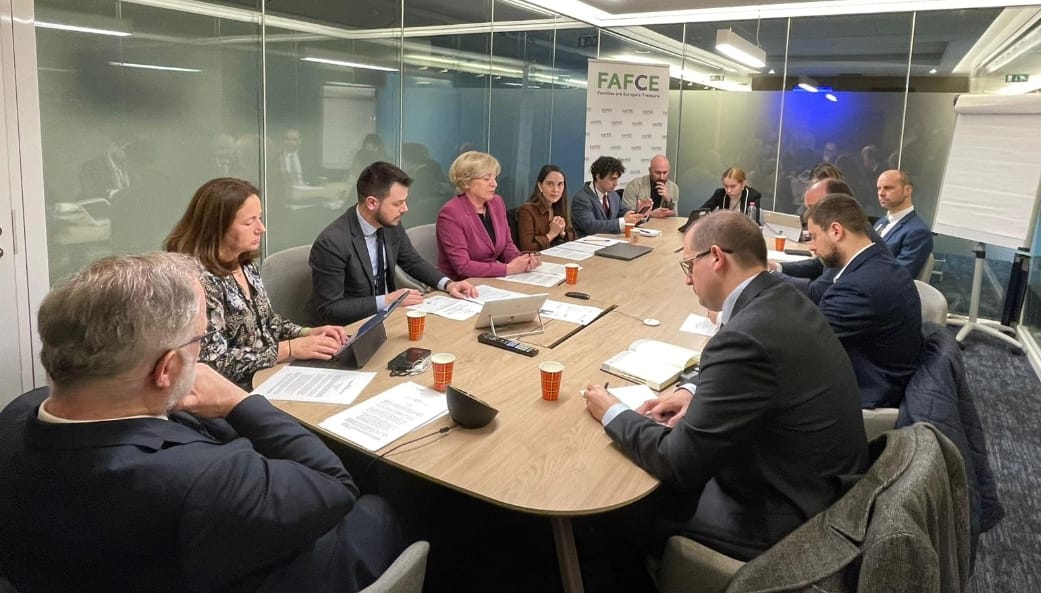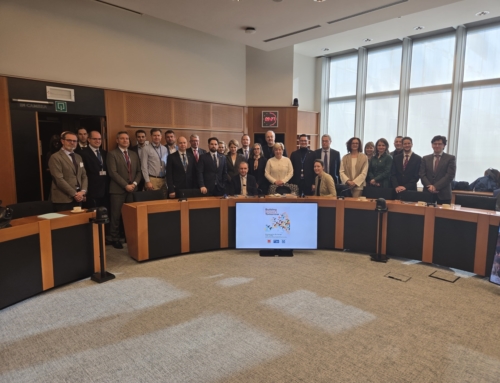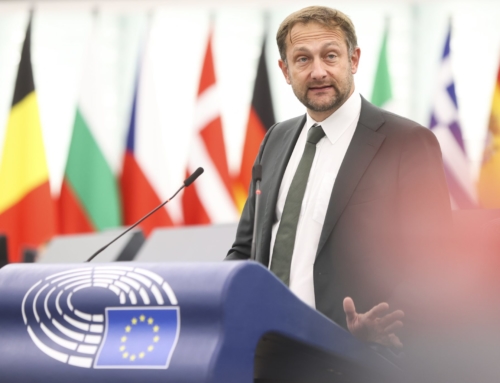Brussels, 20th March 2024
FAFCE co-hosted a conference yesterday entitled Investing in the Family, Investing in the Future. Held at the European Parliament in Brussels, the conference emphasised the significance of investing in family policies for a brighter future.
Co-host Romana Tomc MEP (EPP) serves as co-chair on the intergroup on Demographic Challenges, Family and Work Balance, and Youth Transition. In her address, she expressed that “we are jumping from crisis to crisis. The challenge is enormous and we can only imagine how the European Union will look like in 50 years.”
She added that “the Parliament can do a lot more than it is doing now”, stressing that “we cannot talk about demography without talking about family.”
Tomc reminded that it is not enough to pursue social policies, but we must also win hearts and minds: “it is even harder to change cultural attitudes on the family and demography than it is to implement the recommendations in the toolbox”.
The conference also featured Toma Šutić, Member of the Cabinet of the Vice President for Democracy and Demography at the European Commission. He set the context for his contribution by saying that “all member states have job shortages and low birthrates – they are now saying that jobs are looking for people rather than the other way around.”
Šutić raised the fact that the demographic winter has a knock-on effect on social and economic matters, such as public finances and sustainability. With regards to the question of an ageing population, he said that “people born today may live beyond 100 years – our health and care systems are not prepared for that.”
The commissioner also invited FAFCE to collaborate on projects to “create an understanding of the value of the family through data.”
MEPs in attendance provided further comments during the meeting. One of them was Margarita de la Pisa MEP (ECR) from Spain, who remarked that the demographic winter is “a symptom of our societies.”
Sticking with the medical metaphor, she identified that “there are already clinical problems with the way of life we are pursuing”, referring to addictions and the mental health crisis. She asserted, “the youth are not finding meaning in life. There will be a reaction.”
She reflected on the beauty of the family, adding, “those who have the privilege to be raised with the stability of a family who love them unconditionally learn the soft skills that we always talk about”.
She continued, focusing on the subject of womanhood, to say that “the woman’s role in professional and political life must be encouraged.” Moreover, she declared, “we also must give value to maternity.”
The conference concluded with a summary from FAFCE Senior Policy Officer Marta Fernandez De Córdoba, who spoke from her perspective as a mother as well as a legal expert. “We must emphasise the positive externalities of the family. Families are not a cost, but an investment”, began Fernandez de Córdoba.
She noted the popular support for the reality of the family, highlighting recent referendum victories for the family in Ireland, as well as the campaigning by large families in Spain. Member states, she suggested, “must be facilitators of families. Instead we are seeing disincentivisation…as cost of living increases and wages stagnate.”
Fernandez de Córdoba concluded with a plea to encourage people to choose family. Considering the social and cultural emphasis on personal achievements, she said, “it is a difficult choice to have a family today. Some people find it difficult to both keep up professional ambitions and familial. We need to treat mothers in the workforce as mothers as well as workers.”
FAFCE live-tweeted the event. You can read the thread here.
FAFCE has been focusing on the key topics highlighted by the intergroup on Demographic Challenges, Family and Work Balance, and Youth Transition
On Demographic Challenges
FAFCE has long been raising the alarms on the demographic winter, stressing in a board resolution in 2021 that “the family is the demographic and democratic future of Europe”.
In a recent comment regarding demography, Vincenzo Bassi, President of FAFCE, said: “In the context of a demographic winter in Europe and a culture of loneliness, it is the family that holds the key to intergenerational solidarity. To protect and to promote the family is to give our societies the best chance at tackling our digital, ecological, and demographic transitions.”
Reflecting on FAFCE’s involvement on the demography question in Europe, Bassi highlighted: “It is urgent to re-establish the intergenerational balance in Europe. To do so, we need to build a new paradigm to put the family at the centre of long-term public policies in Europe.
“The demographic issue concerns all, and it is appropriate, as well as necessary, to create institutional exchanges at the European and international level with the aim of promoting a new demographic spring. Family policies are a direct competence of every State. But this does not prevent them from taking initiatives by mutual agreement, across political alignments, for the exchange of good practices and for the promotion of family-friendly policies”.
On Family and Work Balance
FAFCE is a member of the European Sunday Alliance, which campaigns for a work-free Sunday and a right to disconnect. Further to this, FAFCE’s policy calls include:
- family-based taxation systems in order to prevent the unequal treatment of parents and carers
- adequate and fully paid access to maternity, paternity and parental leaves for parents, regardless of effective time worked
- full freedom to parents to decide on the division of the leave between the father and the mother
- legally recognise the right to disconnect and a work-free Sunday, as fundamental freedom of each person
- implement national action plans of the Child Guarantee
- end discrimination of women in the workplace
In a recent comment related to work and family balance, Vincenzo Bassi, FAFCE President, said: “workers cannot be viewed solely as a group of individuals, but as part of families and communities contributing to the common good. They are also often parents, husbands, wives, and sons and daughters – when we consider the rights of workers we should also consider their family responsibilities”.
On Youth Transition
FAFCE’s latest board resolution focused on Young people and mental health: families as their best allies, emphasising the need for intergenerational solidarity.
FAFCE urges European institutions and EU member states to:
- Develop a human-centred approach to mental health, focusing on the human dignity of each child, youth and their families, recognising the role of families and informal care.
- Promote a culture of life, solidarity and community, that can help the youth in fostering trust in the future, while coping with economic, social and cultural obstacles.
- Recognise the valuable work and support of grandparents in the everyday well-being of children and youth, taking care responsibilities, and transmitting hope and experience of life to the younger generations
- Undergo an in-depth analysis on the roots of mental health distress on young generations, taking into consideration the impact of digitalisation and demographic change, digital addictive behaviour, cyber violence, sexual abuse, promotion of unclear concepts regarding the so-called “gender self-determination”, no work-family balance, youth unemployment, instability of family relationships and the lack of family members commitment.
- Promote the development of National Action Plans (NAPs) to support families, family networks and associations and schools at the forefront of depression and suicide prevention initiatives, with training on detection and prevention as well as support for those who have lost someone through suicide; include parent and family associations in the development of these policies.
- Recognise digital addictions as a potential source of mental health disorders in children and youth; establish and implement targeted policies to combat the specific impact of digital addictions, drug abuse and addiction.
- Take legislative action against oversexualization of content online and in advertisement, particularly depicting children; coordinate EU Member States to collect all data regarding pornography production and consumption trends by both minors and adults.
- Take into consideration the impact of the well-being of mothers and pregnant women on the mental health of their children, also before birth, and draw attention to particular support in actions taken.
- Consider the role of sports and music activities, especially collective, and children participation as a preventive measure, and support families with difficulties to involve children through school, community or family associations programmes.
- Establish the Sunday as a weekly day of common rest, thus favouring family and social cohesion.









